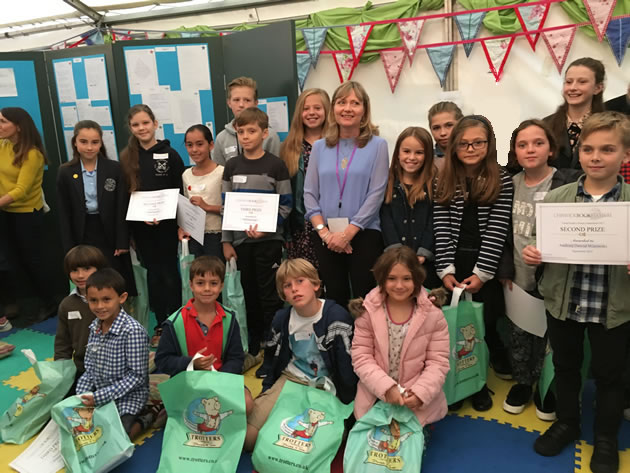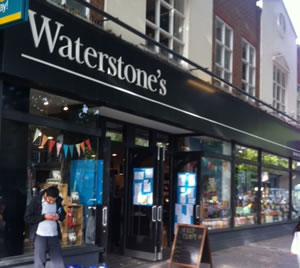High Praise for Young People's Poetry Competition Winners
Their work is can be seen at Waterstone's for a limited time only

Poetry competition organiser Nicola Kelly with the winners
|
Poetry Winners at Chiswick Book Festival and now Waterstone's
Last Saturday (16 September) the Chiswick Book Festival once again held the prize-giving for the Young People's Poetry Competition 2017.
Now in its seventh year, the competition involves children in Years 3-7 from schools throughout the London area. 157 young poets entered this year and 32 prizes were awarded within each of the five year groups.
Young poets entered from schools across the area including : St Peter's Church of England Primary School, Cavendish Primary School, Chiswick & Bedford Park School, Orchard House School, Southfield School, The Falcons School for Boys, St Augustine's Priory, Godolphin & Latymer School for Girls and Strand on The Green Primary school.
Children are invited to write a poem at home, or at school, about whatever inspires them to write. There is an annual prize-giving held at the Chiswick Book Festival where young poets and their parents can hear about the winning poems and what made their poems shine out. Nicola Kelly, the event organiser and one of the judges on the panel said, “We are always delighted by the enthusiasm and high standard of poems entered and this year was no exception”.
The other judges teachers Carol Douglas and Susi Stanley-Caroll, and lead judge, poet James Priestman were also on hand on Saturday to greet the winners and congratulate them on their work.
Speaking at the prize-giving held in the festival marquee, lead judge James Priestman celebrated the emotional power and diversity of the entries, ”Once again thank-you for your poems. Thank-you for making us laugh, for telling us about issues that are important to you, for making us think in a new ways .. and for giving us some insight into your inner thoughts – your anxieties and hopes.”
The competition is sponsored by Chiswickw4.com and Trotters children's wear and accessories. Torin Douglas, Festival Director and Father Kevin of St Michael and All Angels church presented the prizes. Each of the winners received a special Chiswick Book Festival certificate from ChiswickW4.com and a goody bag of gorgeous books donated by Trotters.
The winners, and commendations from all the year groups are listed below but you can see them for yourself now, as they are displayed in Waterstone's for a limited time only, on Chiswick High Road.
Competition Winners
Year 3
First Prize
‘Imagine’ Maddy Hall
Joint Second Prize
‘Netball Life’ Teagan Flint
‘The Tiger’ Eduardo Kemlo
Joint Third Prize
‘The Smell of my Family’ Martina Barbieri ( Chiswick & Bedford Park School)
‘My Dog’ William Sykes
Commendations
‘’Romans’ Harry Hemans (Cavendish Primary School)
‘Fantastic Four Seasons’ Anabella Law
Year 4
First Prize ‘All Kinds of dogs’ Beatrice Lafford
Second Prize ‘Balloon, Balloon’ Andrzej Dawid Wizowski
-Third Prize ‘The Motorway’ Tristan Duffy
Commendations (3)
‘ The Wonder of It’ Sophie Morrow
‘Billy Backward’ Anoushka Jary
‘My Family’ Finn Murray
Year 5
First Prize
‘ A Raindrop’ Charlotte Sykes
Second Prize
‘The Teacher’s Lounge’ Rosie Petter
Joint Third Prize
‘Liverpool ‘ Wilf Jennings
‘The Old man who sits on the Common’ Hope Glynn
Commendation
‘Butterfly’ Clementine Lloyd-Williams
‘Home’ Sean Doran
Year 6
First Prize 'So I swim on’ Jake Cleaver
Second Prize ‘Jousting at Blenheim’ Hebe Russell
Third Prize
‘The Miner’s battle: Orgreave ‘84’ Alex Ward
Commendations
‘Silence ‘ Thea Metreweli
‘Ballet’ Madeleine Halliday
Year 6
Commendations
‘Life as an 11 year old girl’ Ava Bileckyj
‘Space’ Aamina Hussain
Year 7
First Prize ‘I saw a Dancing Bear’ Millie Vadon
Second Prize ‘Seesaw’ Lucy Williams
Joint Third Prize
‘The Stray’ Lily Rai
‘My Life’ Callum Sharp
Commendations
Wishing for Peace’ Annika Tang
‘Eye of the Storm’ Lillian Rodney
Speech for Prizegiving at 2017 Chiswick Book Festival Children's Poetry Competition by James Priestman
Poetic ideas can come in a rush of inspiration and enthusiasm but it is worth taking a moment to think about what it is that a poem is trying to achieve because if you know that then it will be easier to decide which bits of a poem need changing or improving.
Many of you wrote poems to provide amusement . Anoushka Jary wrote about, “Billy Backward from opposite town”. Hope Glynn described an unbelievable man and then claimed he was her grandfather. Rosie Petter asked us to speculate what it is that teachers get up to in the staff-room.
Some of the funniest poems made good use of rhyme, rhythm and repetition. Eduardo Kemlo wrote about a tiger who is nasty and will eat you very fastly! Maddy Hall who won the year three prize, created an upside-down, nonsense world:
“Imagine if children taught teachers
And hit them with a cane,
And far away you could hear their screeches,
Wouldn't that be insane?”
Beatrice Lafford, who won Year four, wrote:
“You can get shiny dogs, you can get whiny dogs
But you always need to feed them.
You can get lazy dogs, you can get crazy dogs
But you always need to bathe them.”
Millie Vadon, who won Year Seven wrote:
“My parents took me to the circus
To see a dancing bear,
The bear was in a tutu
With long lushes hair.”
This had rhyme and rhythm and a sense of the ridiculous that gave it humour but the poem also argued a serious point: the way we treat some captive animals can be very cruel.
Some of your poems were polemical poems: they were arguing a point on an issue that was important to you. Lily Rai wrote about the suffering of stray cats, Lucy Williams wrote about the shortcomings of politicians, Annika Tang wished for peace. These polemical poems were effective when, instead of telling us what to think, they showed us vivid images to suggest how we should feel. Alex Ward described the violent confrontation between police and pickets at Orgreave in 1984:
“The burning flicker of the miner's lamp
As the clatter of coal is pulled up a ramp,
As we enjoy the comforts of home
A sofa, a bed and a brand-new phone.”
Another purpose for a poem is to make the reader see something that may be familiar to them in a new way . Teagan Flint wrote about netball, Wilf Jennings wrote about supporting a football team. Madeleine Halliday wrote about ballet. Aamina Hussain wrote about a comet. Martina Barbieri, Finn Murray and Sean Doran wrote about being with family. William Sykes wrote about being with his dog. Anabella Law wrote an ambitious rhyming poem about the four seasons. Harry Hemans described a rampaging Roman army. Unusual comparisons are an effective way of describing something familiar. Tristan Duffy used the image of African animals crossing a river to describe a motorway.
Some of you described things that are familiar but so small or fleeting that we may never properly observe them with our eyes. Clementine Lloyd-Williams wrote about a Butterfly and Charlotte Sykes, who won the Year Five prize, drew attention to the huge impact that a small raindrop can make:
“it is a bubble of anticipation and surprise. It cleans the earth, it feeds the flowers and fills the holes.”
The poem did not have any rhyme and rhythm but it had the emotional intensity that we would expect from a poem.
The best poems tended to “show not tell.” For example, instead of telling us the sea was cold when he went swimming, Jake Cleaver, who won the Year Six prize, showed us a picture:
“Three, two, one
And away I went
Into the rough sea with my elbows bent.”
The bent elbows are a dynamic image of someone getting into a cold sea, helping us to imagine the coldness and so feel it much more vividly than if he had tried to write a description of the coldness.
Sometimes the purpose of a poem is to describe something with which the reader will be unfamiliar . This often means that the poem is about the writer's inner self - their hopes, anxieties and confusions. Ava Bileckyj described her “Life as an 11 year-old girl”. Sophie Morrow thought about the future. These sort of poems, whilst being intensely meaningful for the person who wrote them, can be difficult for the reader to appreciate. Once again, it is better to “show not tell”, to focus an image that describes the feelings you have rather than to say in detail what those feelings are. Lillian Rodney imagined a storm on her bed. Thea Metreweli wrote about the silence that followed a loud conflict. Andrzej Dawid Wizowski imagined a lost balloon and Callum Sharp was walking in quicksand. Hebe Russell used a story of knights jousting to describe her feelings about the life and death of a woman she knew.
Once again thank-you for your poems. Thank-you for making us laugh, for telling us about issues that are important to you, for making us think in a new way about things we knew already and for giving us some insight into your inner thoughts – your anxieties and hopes. I hope this short speech has helped you to think why it is you might write a poem and the techniques you might use to make that poem really do what you want it to do. Those techniques might include rhyme, rhythm, unusual comparisons. And please remember it is usually better to show an image in a poem rather than to tell us directly what you think.
September 24, 2017
